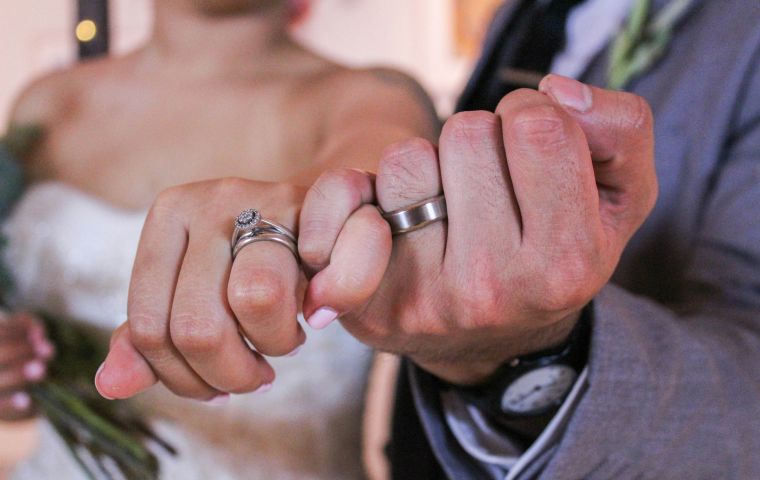MercoPress. South Atlantic News Agency
Bi-cultural marriages in South American countries: The Ukrainian connection
 Photo: Unsplash
Photo: Unsplash In the vibrant tapestry of South American societies, bi-cultural marriages have become increasingly common, weaving together diverse traditions, languages, and perspectives. Among these, marriages between South American nationals and Ukrainian women stand out as a fascinating example of cross-cultural union, highlighting the challenges and enrichments such relationships bring to the forefront.
The Allure of Cross-Cultural Unions
Bi-cultural marriages offer a unique blend of cultural exchange, mutual learning, and shared experiences that enrich both partners' lives. For South Americans and Ukrainians alike, these unions are opportunities to explore new traditions, languages, and ways of life, fostering a deep understanding and appreciation of cultural diversity. Especially now, the ukrainian bride personifies the thirst for learning new knowledge and for preserving their cultural heritage.
● Cultural Exchange: Couples enjoy the richness of sharing traditions, from Ukrainian Christmas celebrations to the vibrant festivities of South American Carnaval.
● Language and Communication: Learning each other's languages strengthens bonds and deepens understanding, while also offering practical benefits in both personal and professional spheres.
● Shared Values: Despite cultural differences, many couples find common ground in shared values such as family importance, resilience, and a strong work ethic.
The Ukrainian Influence in South America
Ukrainian women bring to their South American families a rich cultural heritage characterized by resilience, a deep appreciation for the arts, and a strong sense of community. Their influence is evident in the multicultural fabric of their new homes, from the introduction of Ukrainian cuisine to the celebration of traditional Ukrainian holidays, enriching the cultural landscape of South American countries.
The Top 5 Challenges of Bi-Cultural Marriages
Bi-cultural marriages, such as those between South American nationals and Ukrainian women, bring together rich tapestries of cultural backgrounds, creating unique opportunities for growth and learning. However, these unions are not without their challenges. The blending of cultures, while beautiful, can also lead to complexities that require understanding, patience, and effort to navigate successfully.
1. Language Barriers
- Communication Hurdles: One of the most immediate challenges is the language barrier. Effective communication is foundational to any strong relationship, and when partners speak different native languages, misunderstandings can occur, complicating even simple daily interactions.
- Emotional Connection: Language is deeply tied to emotion. Expressing feelings, desires, and concerns in a non-native language can be frustrating for both partners.
2. Cultural Misunderstandings
- Differing Norms and Values: Every culture has its own set of norms, values, and expectations. What is considered polite or appropriate in one culture may be misunderstood in another, leading to conflicts or hurt feelings.
- Celebration and Tradition Conflicts: Holidays, traditions, and ways of celebrating can differ vastly, potentially leading to feelings of loss or exclusion for the partner who is away from their home country.
3. Differing Family Roles Expectations
- Traditional vs. Modern Roles: Expectations about roles within the marriage and family, such as who is responsible for household chores, raising children, and earning income, can vary greatly between cultures.
4. Legal and Bureaucratic Challenges
- Immigration Issues: Legal hurdles related to residency, work permits, and citizenship can be overwhelming. Navigating the bureaucratic maze of immigration laws requires time, patience, and often significant financial resources.
- Cultural Integration: Beyond the legal aspects, there's the challenge of cultural integration into the partner's community and society, which can be a lengthy and emotionally taxing process.
5. Social Acceptance
- External Judgments: Couples might face skepticism or disapproval from society or even within their families, based on stereotypes or prejudices against their partner's nationality or culture.
The Role of Community and Support
For bi-cultural couples, the support of both their local and expatriate communities can be invaluable. Community organizations, cultural associations, and social groups play a crucial role in helping couples navigate the complexities of integrating two cultures within their family life. These networks provide a sense of belonging, offer practical advice, and celebrate the richness of cultural diversity.

Photo: Unsplash
Concluding Remarks
Bi-cultural marriages between South American nationals and Ukrainian women are emblematic of the broader phenomenon of global interconnectivity and cultural exchange. These unions are testaments to the power of love and mutual respect in overcoming cultural barriers, enriching not only the lives of the couples and their families but also the broader communities they inhabit.
As society continues to evolve, the experiences of these couples offer valuable insights into the complexities and joys of living within a multicultural world, underscoring the beauty of diversity and the unifying power of shared humanity. Love knows no borders and always wins—this is the deep message that marriages between representatives of different nationalities give us.




Top Comments
Disclaimer & comment rulesCommenting for this story is now closed.
If you have a Facebook account, become a fan and comment on our Facebook Page!